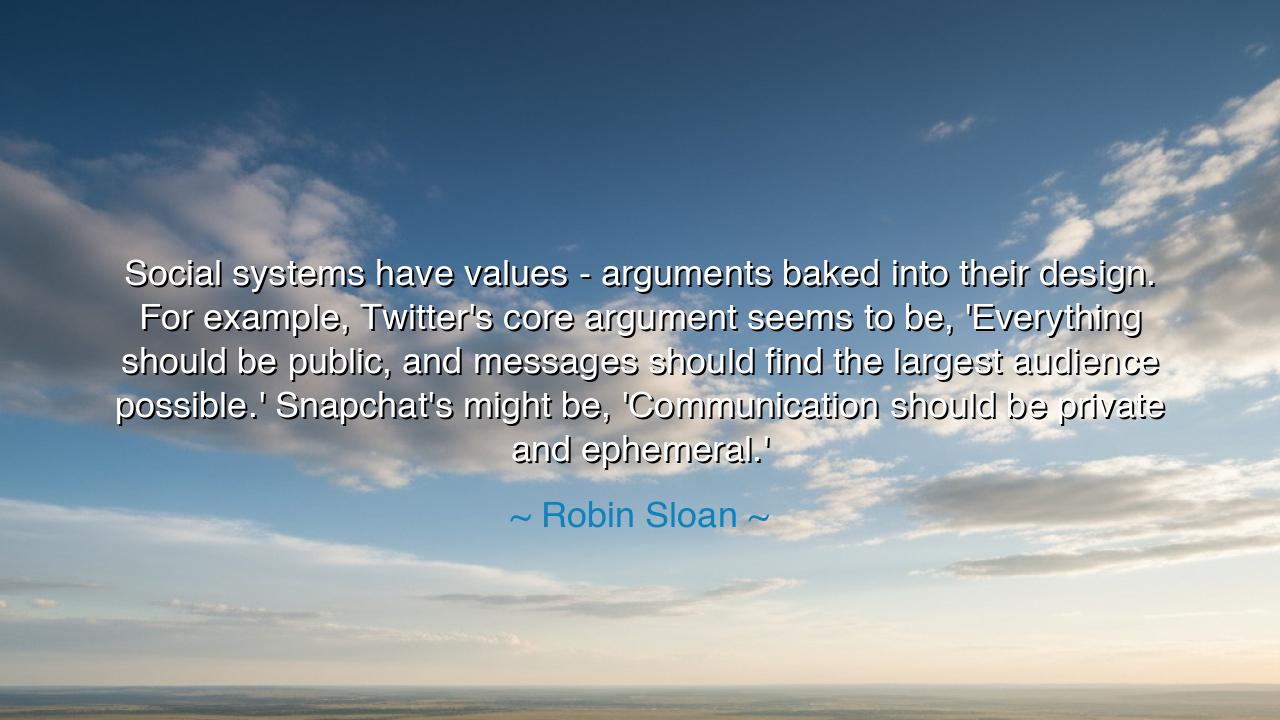
Social systems have values - arguments baked into their design.
Social systems have values - arguments baked into their design. For example, Twitter's core argument seems to be, 'Everything should be public, and messages should find the largest audience possible.' Snapchat's might be, 'Communication should be private and ephemeral.'






Host: The soft glow of the evening light casts a warm, almost reflective mood in the room. Jack and Jeeny sit across from each other, their conversation feeling like a quiet exploration of deeper ideas. Outside, the sounds of the evening are muted, but inside, the discussion has taken on a thoughtful tone. Jack takes a sip from his drink, his brow furrowing slightly as he processes the quote they’ve just shared.
Jeeny: "Robin Sloan said, 'Social systems have values - arguments baked into their design. For example, Twitter's core argument seems to be, 'Everything should be public, and messages should find the largest audience possible.' Snapchat's might be, 'Communication should be private and ephemeral.' Isn't it fascinating how these platforms are designed to reflect different values? What do you think, Jack—do you think these platforms are shaping how we communicate and connect with each other?"
Jack: He nods slowly, clearly engaged with the idea. "Absolutely. These platforms aren’t just tools—they are shaping the way we interact, the way we communicate. The design of each one encourages a certain kind of engagement and expression. Twitter, for example, is built around the idea of publicness. Everything you say has the potential to be seen by millions. It pushes people to think in terms of audience, of broadcasting their thoughts to the largest group possible." He pauses for a moment, his voice thoughtful. "That’s why you see so much of the quick, headline-style communication on Twitter—it’s all about getting noticed, getting shared."
Jeeny: "Right, and with Snapchat, it’s the exact opposite. The focus is on privacy and ephemerality—you send a message, it disappears after a short time. It's about the moment, not the audience. It’s more personal, more intimate, like a conversation between two people or a small group, where there’s less concern for the larger world watching." She leans forward, her voice gaining momentum. "What’s interesting is that these platforms aren’t just reflecting how we communicate—they’re actively shaping how we value communication itself. With Twitter, there’s this emphasis on publicity, and with Snapchat, it’s about privacy and letting go of permanence."
Jack: "Exactly. It’s like the platforms are not just giving us a way to communicate—they’re creating a whole cultural framework around it. Each one comes with its own set of norms and expectations, and we subconsciously adapt to those. With Twitter, you’re expected to be direct and engaging, to communicate quickly and publicly. With Snapchat, the idea is that you can share something without worrying about it being out there forever, making it feel more freeing." He smiles slightly. "It’s like each platform has its own personality, and we adapt to that personality based on what we want out of the interaction."
Jeeny: "Yeah, and I think this also speaks to the growing tension we’re seeing in the world of social media, right? The clash between public and private communication. On one hand, we’re encouraged to share everything and reach the largest audience possible, but on the other, we’re starting to crave those more private, intimate interactions, where we’re not constantly worried about being judged or viewed by everyone else." She pauses, her voice a little softer now. "There’s this balance we’re trying to find between sharing our lives and keeping some parts of ourselves just for the people we trust."
Jack: "Yeah, that’s the interesting part. The core argument of each platform is built into its DNA, and we naturally adapt to that. But it also makes me think about the future of communication. Are we moving towards a more public world, or are we heading back to something more private, where only certain things are meant to be shared? There’s a growing need for privacy and authenticity, and I think platforms will have to adapt to that tension if they want to remain relevant." He sighs, almost in contemplation. "But I also wonder if the very nature of being online means we’re already giving up privacy in some sense."
Jeeny: "That’s the challenge, isn’t it? The idea of privacy in a digital age seems like a contradiction. The more we share, the more we lose our sense of privacy. But, at the same time, it’s hard to disconnect from these platforms that shape so much of how we interact with the world. I think we’re still figuring out how to balance the benefits of connectivity with the need for personal space. And as these platforms continue to evolve, it’ll be interesting to see how they navigate this tension between public and private communication." She smiles, her voice light but thoughtful. "In a way, social media has created a new type of intimacy—one that’s both open and fragile."
Host: The room feels quiet now, filled with the weight of their conversation. The world outside moves forward, but inside, Jack and Jeeny are deep in thought, reflecting on how social media platforms are reshaping not only how we communicate, but how we think about publicity, privacy, and connection itself. Social systems, as Robin Sloan pointed out, have values that are baked into their design, and those values influence everything from our self-expression to our very understanding of the relationships we form.
As the evening continues, there’s a sense of reflection—a recognition that, in the digital age, communication is no longer just about sharing information, but about deciding how and where we want to be seen. The balance between public and private is more important than ever, and in this moment, Jack and Jeeny both understand the power that social platforms hold in shaping not just conversations, but the very way we interact with the world around us.






AAdministratorAdministrator
Welcome, honored guests. Please leave a comment, we will respond soon